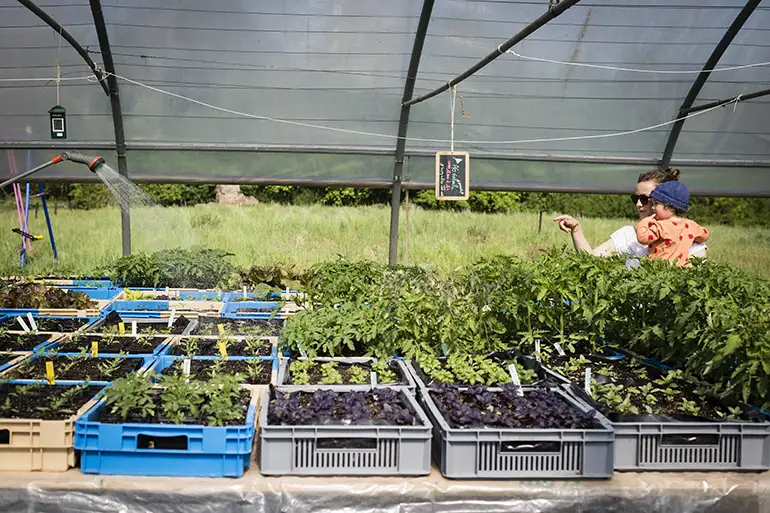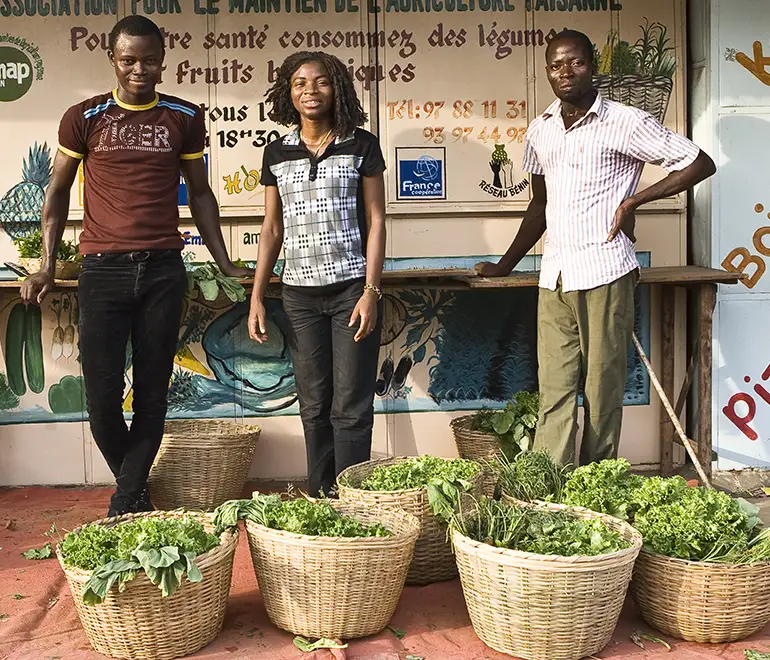Agroecology: A sustainable solution for the planet and humankind
To address current environmental issues and encourage regional food independence, Fondation de France supports agroecology research, as well as a wider diffusion of agroecological practices. A long-term commitment to a new way to produce, distribute and consume – a goal that is more relevant than ever.
Today, the agricultural model that has prevailed for decades has come to a dead end. At a time when climate emergency, biodiversity collapse, health crisis and the war in Ukraine has shown us just how fragile and dependent our agricultural and food systems are, a profound transformation is in order. Which poses a question: how can we farm in a way that allows everyone to have access to wholesome food, without endangering our planet’s equilibrium? Aware of this essential issue, for the last ten years Fondation de France has committed to an innovative approach: agroecology. Since 2013, it has supported 324 projects to promote the food and agroecological transition. What’s more, numerous donor-advised funds have mobilized to encourage this move towards sustainable farming methods.
Among them is Fondation Ecotone, which works specifically on the link between agroecology and biodiversity, promoting, for example, the replanting of almond trees in Provence. Fondation Léa Nature-Jardin Bio focuses on the food and agroecological transition by supporting, among other things, training in sustainable farming practices. Fondation Terra Symbiosis promotes new and innovative rural models through the Colibris movement, created by agroecologist Pierre Rabhi. Very active in France and around the world, Fondation Lemarchand is mobilizing for Mother Earth by developing experimental farms where biodiversity and respect for the living world is at the heart of agricultural techniques. On an international level, Fondation Félix et Eliane Genève supports nonprofits in Africa and Latin America with the aim of guiding farmers towards agriculture without pesticides, thus improving the quality of both food and revenues for local populations.

Agroecology: a response to environmental challenges
Recently, a United Nations report on the Global Land Outlook (published April 27, 2022) revealed that 40% of the Earth’s land has been degraded, and that farming was responsible for 80% of all deforestation. Faced with these major environmental challenges, developing agroecological practices will make it possible to reduce negative impacts related to intensive agriculture. Laetitia Cuypers, head of Fondation de France’s Agroecology Program, explains: “Agroecology is based on cooperation between humans and nature, which puts natural control processes (nitrogen, carbon and water cycles, relying on backup systems, etc.) at the center of agricultural practices and thus allows us to avoid using chemical substances that are harmful to biodiversity, soil quality and water.”
To encourage this approach, in 2013 a first call for projects, entitled “Agriculture-Food-Ecosystem” was launched by Fondation de France with Fondation Daniel et Nina Carasso, which is very committed to this issue. The goal is to support action-research projects that experiment with new agricultural and food system practices. This systemic process encourages multidisciplinary collaborations, bringing together professionals who are not used to working with each other: researchers, agricultural engineers, farmers, as well as environmental and food experts. For Bertrand Hervieu, president of the Ecological and Food Systems Transition Committee at Fondation de France, “transition issues should become everyone’s business and not the prerogative of a few specialists. By initiating new collaborations, the results will have even more impact.” Consequently, close to 100 projects have been supported. One of them being the “Agroecology in the Camargue” project, whose double goal is the preservation of the region’s exceptional biodiversity and maintaining agricultural activity (rice and wheat). After identifying ecological practices and infrastructures (hedges, canals, marshland) that foster the return of multiple species (birds, bats, dragonflies, etc.) to large farms, the project will make concrete recommendations to farmers so that they can engage in agroecological practices while promoting the protection of wildlife.
The promise of wholesome food for everyone
Agroecology also means a revolution of the entire food supply chain from farm to fork. Because another major challenge is food and energy independence. The succession of environmental and health crises, not to mention the current war in Ukraine, has severely impacted many regions of the world, including Europe, which is threatened by disruption in the supply of cereals, fertilizer and energy. For Laetitia Cuypers, “agroecology means moving away from dependent agricultural systems. First of all, from imported chemical substances and then from imported proteins meant to feed livestock on farms (in particular soybeans).”
Since new solutions can cross borders, Fondation de France’s Agroecology Program has also supported nonprofit awareness campaigns on a European level. For example Pour une autre PAC (For Another CAP) and ARC2020, which aim to influence European Union politicians on the subject of agroecology. Fondation de France is also a member of EFSAF (European Foundations for Sustainable Agriculture and Food Systems), a task force and network for European foundations that is itself a member of Philéa, which is committed to sustainable food and agriculture.
On an international level, and in particular in West Africa, Fondation de France also supports the development of sustainable agricultural practices and healthful eating. Its Promoting Family Agriculture in West Africa Program has made over 200 actions possible since it was created in 2009. Its goals: introduce new agroecological methods, develop and exchange best practices and help farmers commercialize their products, especially through cooperatives. The overall objective being to promote the local supply chain and reinforce food security.
In collaboration with three other European and American foundations, another program, JAFOWA (Joint Action for Farmers’ Organizations in West Africa), works with local farmer organizations to promote and develop the agroecological transition in Burkina Faso, Senegal and Togo. Finally, Fondation de France partners with ROPPA (Réseau des organisations paysannes et de producteurs de l’Afrique de l’Ouest, Farmers and Producers Network of West Africa) to support their actions promoting and defending effective and sustainable small-scale farming and serving family farms and agricultural producers.

Encouraging scale-up
After having initiated and encouraged experimentation, the challenge for the Agroecology Program at Fondation de France now is to replicate, scale up, and disseminate transition initiatives. “This scale-up is necessary to start a true transformation in practices. That is why we make it a priority to support projects that from the start aim to expand and transfer knowledge and processes,” explains Laetitia Cuypers. Certain emerging high-stakes issues were targeted in the call for projects 2022, such as regional food resilience (permitting them to adapt to crises like climate change or the consequences of the war in Ukraine), or food justice and democracy (in particular, in connection with the idea of setting up a “Social Security of Food”).
In line with this theme, ISARA’s (Institut Superieur d’Agriculture Rhône-Alpes, Rhône-Alpes Agriculture Institute) “Babette” project in the metropolitan Lyon area sought to help low-income families have access to good-quality food in a way that respects their culinary habits, knowledge, culture and wishes. Thanks to Fondation de France’s support, Babette has been able to develop two initiatives: the Bio’Vrac project, which offers organic product at low-prices, and Légum’au Logis, which organizes a weekly sale of local produce baskets. The project’s results were consolidated in a how-to guide published by ISARA on setting up food systems that are local, inclusive, sustainable and accessible to people who are in financial difficulty.
With a similar desire to launch a global transformation from production to consumption, Fondation EG Afrique is taking action in northern Togo. It has opened two centers there that offer training in sustainable agriculture and good nutrition. For a period of six months, farming families are introduced onsite to environmentally sound, no-impact cultivation techniques before returning to their villages and spreading these good practices.
Much more than a change in agricultural practices, agroecology renews the way we consume food. By bringing together the various parts of the food production chain, as well as inhabitants and environmental actors, it creates the conditions for a global system that protects the health and resources of everyone.
Bertrand Hervieu, president of the Ecological and Food Transition Committee
“At the Ecological and Food Transition Committee, we think about the commons, an idea that questions the relationship between humans and their common heritage: nature. The goal being that the ecological transition is not the realm of a few specialists but includes as many people as possible, especially those that are most in need. This means the projects should be less compartmentalized so they can integrate other players who come from the world of social work, nonprofits and local agencies, as well as citizens. The importance of the ecological transition should mobilize partners from all backgrounds so we can come up with viable solutions.”

